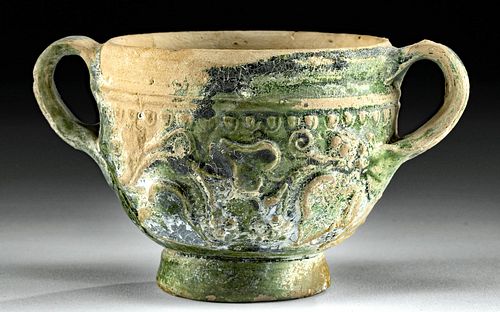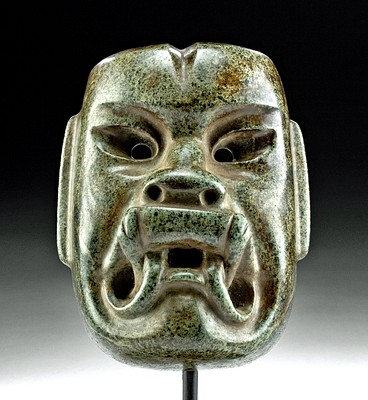Roman Green Glazed Pottery Vessel, ex Royal Athena
Lot 67
About Seller
Artemis Fine Arts
686 S Taylor Ave, Ste 106
Louisville, CO 80027
United States
Selling antiquities, ancient and ethnographic art online since 1993, Artemis Gallery specializes in Classical Antiquities (Egyptian, Greek, Roman, Near Eastern), Asian, Pre-Columbian, African / Tribal / Oceanographic art. Our extensive inventory includes pottery, stone, metal, wood, glass and textil...Read more
Categories
Estimate:
$1,400 - $2,100
Absentee vs Live bid
Two ways to bid:
- Leave a max absentee bid and the platform will bid on your behalf up to your maximum bid during the live auction.
- Bid live during the auction and your bids will be submitted real-time to the auctioneer.
Bid Increments
| Price | Bid Increment |
|---|---|
| $0 | $25 |
| $300 | $50 |
| $1,000 | $100 |
| $2,000 | $250 |
| $5,000 | $500 |
| $10,000 | $1,000 |
| $20,000 | $2,500 |
| $50,000 | $5,000 |
| $100,000 | $10,000 |
| $200,000 | $20,000 |
About Auction
By Artemis Fine Arts
Oct 7, 2021
Set Reminder
2021-10-07 10:00:00
2021-10-07 10:00:00
America/New_York
Bidsquare
Bidsquare : Exceptional Antiquities Ethnographic Fine Art
https://www.bidsquare.com/auctions/artemis-gallery/exceptional-antiquities-ethnographic-fine-art-7537
Museum-worthy examples of Egyptian, Greek, Roman, Etruscan, Near Eastern, Far East / Asian, Pre-Columbian, African / Tribal, Oceanic, Native American, Spanish Colonial, Fossils, Ancient Jewelry, Fine / Visual Arts, so much more! Artemis Fine Arts info@artemisgallery.com
Museum-worthy examples of Egyptian, Greek, Roman, Etruscan, Near Eastern, Far East / Asian, Pre-Columbian, African / Tribal, Oceanic, Native American, Spanish Colonial, Fossils, Ancient Jewelry, Fine / Visual Arts, so much more! Artemis Fine Arts info@artemisgallery.com
- Lot Description
Roman, Imperial Period, ca. 1st to 3rd century CE. A rare example of a glazed ceramic vessel, mold-made, with a beautiful floral motif in high relief around its exterior body. The vessel form is similar to a skyphos, with a round body, a pronounced foot, and two small, loop handles. A thick olive green and deep navy-blue glaze covers much of the body, which has aged to have an interesting surface replete with fine craquelure. Size: 4.75" W x 2.6" H (12.1 cm x 6.6 cm)
Roman glazed vessels were technically difficult to produce, and as a result are quite rare - for example, they were only produced at two locations in Roman Britain, Holt and Caerleon. Most were made in Italy, central Gaul, and possibly modern-day Serbia and Romania. They were manufactured by dipping pottery items into a lead oxide "frit," a raw glaze suspended in water. When the vessel was fired, the lead oxide reacted with the silica in the clay, creating a color that ranged from yellow to green to dark brown.
For a similar example of the lead-glazed skyphos, please see The British Museum, museum number 1931,0514.1
Provenance: East Coast collection, New York Gallery, New York City, New York, USA, acquired before 2010 from Royal Athena Gallery, New York, New York, USA
All items legal to buy/sell under U.S. Statute covering cultural patrimony Code 2600, CHAPTER 14, and are guaranteed to be as described or your money back.
A Certificate of Authenticity will accompany all winning bids.
PLEASE NOTE: Due to recent increases of shipments being seized by Australian & German customs (even for items with pre-UNESCO provenance), we will no longer ship most antiquities and ancient Chinese art to Australia & Germany. For categories of items that are acceptable to ship to Australia or Germany, please contact us directly or work with your local customs brokerage firm.
Display stands not described as included/custom in the item description are for photography purposes only and will not be included with the item upon shipping.
#141995Intact, with excellent craquelure on remaining glaze on surface, and light encrustation in some small areas.Condition
- Shipping Info
-
All shipping is handled in-house for your convenience. Your invoice from Artemis Gallery will include shipping calculation instructions. If in doubt, please inquire BEFORE bidding for estimated shipping costs for individual items.
-
- Buyer's Premium



 EUR
EUR CAD
CAD AUD
AUD GBP
GBP MXN
MXN HKD
HKD CNY
CNY MYR
MYR SEK
SEK SGD
SGD CHF
CHF THB
THB















